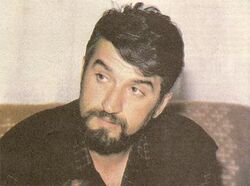Biography:Vukašin Šoškoćanin
Vukašin Šoškoćanin | |
|---|---|
 | |
| Nickname(s) | Vule, Šoša |
| Born | Borovo Selo, PR Croatia, FPR Yugoslavia |
| Died | 15 May 1991 (aged 32) Danube River, SFR Yugoslavia |
| Buried | Bođani Monastery |
| Allegiance | Template:Country data Socialist Federal Republic of Yugoslavia Template:Country data Republic of Serbian Krajina |
| Years of service | 1990–1991 |
| Rank | Commander |
| Battles/wars |
|
Vukašin Šoškoćanin (Serbian Cyrillic: Вукашин Шошкоћанин, pronounced [ʋukǎʃin ʃoʃkǒ:tɕanin]; 24 June 1958 – 15 May 1991) was a Croatian Serb war commander active during the Croatian War.
Biography
Born to Milan and Ljubica Šoškoćanin on 24 June 1958, Vukašin had two brothers, Radovan and Dušan. He became a member of the Serb Democratic Party in 1990. He was a veterinary technician in Vukovar.[1] Šoškoćanin was president of the Borovo commune and commander of the Borovo Selo Territorial Defense Force during the Croatian War, most notably during the Battle of Borovo Selo. He was a known associate of a Serbian war criminal, Vojislav Šešelj. He is also considered responsible for the murder of 12 Croatian policemen in May 1991.
Death and legacy
On 15 May 1991 at around 10:30 AM, while returning from a visit to a refugee camp in Vojvodina, he died by drowning in the Danube river in a "boating accident."[2]
Milan Paroški publicly questioned the official cause of death and claimed that frogmen (either the Yugoslav River Flotilla or the Serbian State Security) were responsible for Šoškoćanin's death.[3] Paroški also claimed that Šoškoćanin was "an excellent swimmer."[3] His death is still labeled under "mysterious circumstances."[4]
After his death and during the occupation of the Croatian territory an elementary school in Borovo was named in his honour. He was posthumously awarded the title of "Hero of the People" by the Serbian authorities in occupied Beli Manastir on 25 September 1991.[5]
References
- ↑ The New York Times (11 May 1991). "Modest Steps In Yugoslavia". https://www.nytimes.com/1991/05/11/world/modest-steps-in-yugoslavia.html.
- ↑ The Philadelphia Inquirer (26 May 1991). "Deep Emotion Beneath Belgrade's Calm". http://articles.philly.com/1991-05-26/news/25799026_1_serbs-croatia-civil-war.
- ↑ 3.0 3.1 Pogledi, issue number 138, pp. 16-17, 9 March 1993; YU ISSN 0353-3832
- ↑ B92. "Let the Tragedy Speak for Itself". http://www.b92.net/specijal/vukovar-eng/press13.php.
- ↑ Mauzolej ratnog zločinca Vukašina Šoškočanina i dalje stoji u Borovu Selu, tportal.hr; accessed 5 May 2021. (in Croatian)
External links
 |

